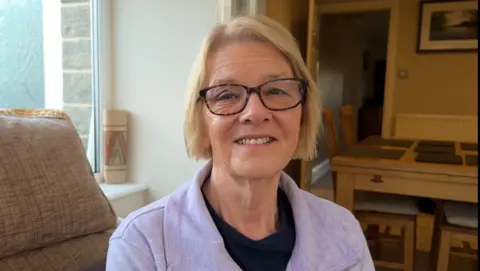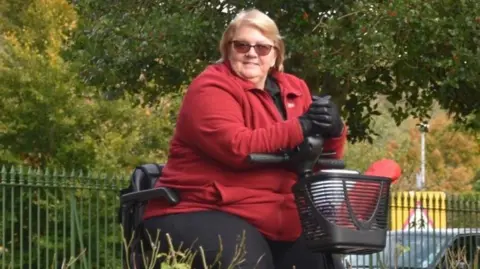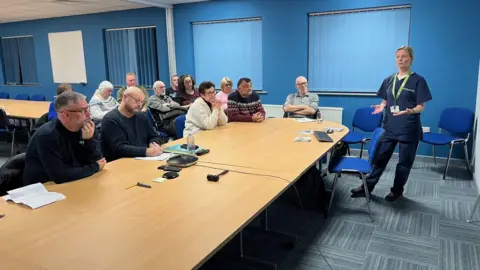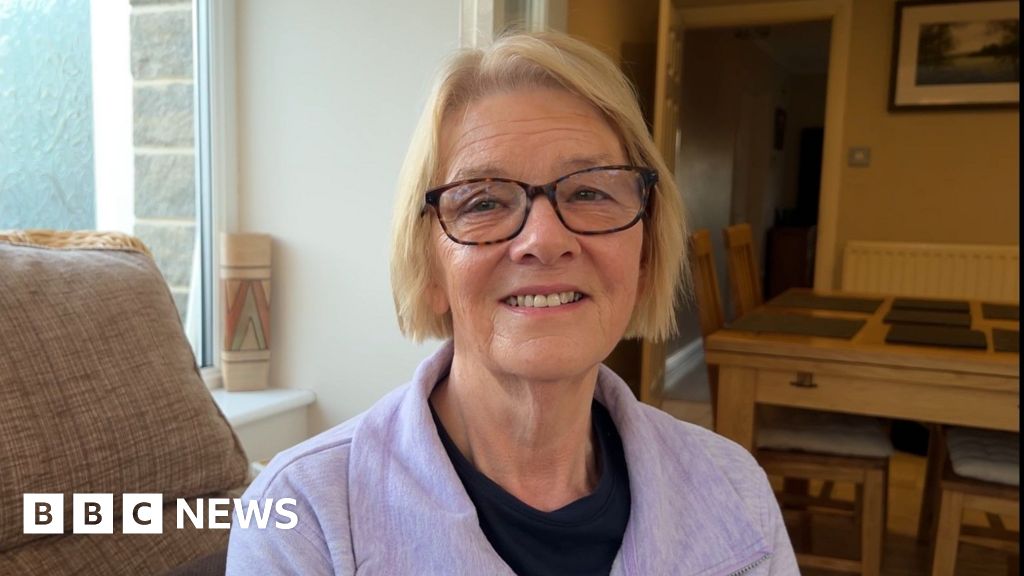Health Correspondent

 BBC
BBCA diabetes patient who lost eight-and-a-half-stone on a low-carb diet recommended by her GP has said it “changed her life”.
Sue Myerscough, 72, from East Morton, near Keighley, used to weigh 19 stone before taking part on the Type 2 diabetes “reversal programme” at her surgery.
The eating plan, which involves cutting out foods like potato and pasta, is different to the standard NHS programme, which is based on a low-calorie approach.
Dr Jackie Craven, who has helped almost 600 patients at the Modality Practice since introducing the low-carb programme six years ago, said they’d seen “fantastic results”.
Mrs Myerscough has been living with Type 2 diabetes for 27 years and was struggling with mobility and pain when she began the course in February 2022.
The GP-led programme helped her to lose six stone in the first year and eight-and-a-half-stone in total, leading to a reduction in medication and an improvement in her health.
“I’m a different person,” she said.
“I just celebrated my 72nd birthday and to be fair I felt 20 years younger than that because I was the old lady and now I’m not.
“I’m able to walk, I’m able to go places I didn’t have access to before, and I can get up and play with the grandchildren, instead of being sat in a chair,” she said.

 Sue Myerscough
Sue MyerscoughType 2 diabetes causes the level of sugar in the blood to become too high, which increases the risk of serious problems with the eyes, feet, heart and nerves.
Some people can control it by making lifestyle changes but the longer someone has it the more likely it is they will need medication.
The diabetes “reversal programme” at the Modality Practice was initially a nine-month course but has since been reduced to three months.
Patients are invited to group sessions where they learn about diabetes and which foods to eat and avoid as part of a low-carb diet.
The aim is to achieve a diet of 40-60g of carbohydrate a day, where an average slice of bread is around 15g.
It has helped 590 patients since it began in 2018, with 141 putting their diabetes into remission, according to the practice.
Dr Craven said: “The average weight loss in three months has been 6kg,” she said.
“It improves their diabetes control and there’s lot’s of other benefits as well, such as reduction in fatty liver disease, and psychologically patients feel a lot happier.”


The low-carb approach is different to the one taken by the NHS which supports suitable patients with a three-month diet replacement programme, where normal food is swapped for low-calorie soups, shakes and nutrition bars.
After the initial 12 weeks patients are then supported to reintroduce healthy, nutritious food into their diet to maintain weight loss.
The NHS has said its programme is “effective” and can work “successfully to improve people’s diabetes control”.
However, Dr Craven said in her experience low-calorie diets “do work” but can be difficult to maintain because it is a “starvation diet”.
“With the low-carb approach they feel fuller for longer with a high protein, high-fat diet”, she said.
Dr Craven said the patients on their programme were closely monitored and the higher levels of fat in the diet had not led to problems.
“On average, patients’ cholesterol levels were staying the same or reducing – and when we look at those patients whose levels had risen, the ‘bad fats’ have significantly reduced.”
The charity Diabetes UK said: “Low-calorie diet programmes that include total meal replacement products and full support from a healthcare team have the strongest evidence for putting Type 2 diabetes in remission, but other approaches such as low-carb diets can also help some people lose weight and go into remission.”
Mrs Myerscough said she was glad “to see the back” of the person she used to be.
“Life is so good now – and life was so painful and so bad then, there’s no comparison,” she said.
“I like my life now more than the food I don’t eat any more.”
Listen to highlights from West Yorkshire on BBC Sounds, catch up with the latest episode of Look North or tell us a story you think we should be covering here.








